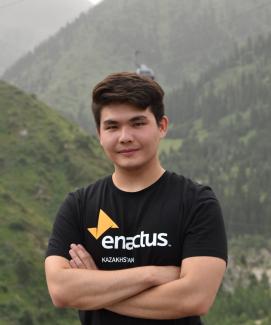Kazakhstani Youth Can Access Help while Applying to Universities
Ever since he was a child, Sayazhan Onlasyn has been interested in computer programming and information technology. He actively participated in competitions for young developers and went on to win youth hackathons. As an adult, Sayazhan has continued to train on the job with information technology (IT) companies while also making time to teach programming to schoolchildren through virtual lessons.
It was as he was helping a friend apply for universities that Sayazhan realized that the field of education was sorely behind other social and professional sectors in using new technologies to increase effectiveness and resource efficiency. “For example, most of the training centers that work with applicants use old techniques and tools. I felt that consulting agencies, school career counselors, and testing centers for SAT, IELTS, and UNT [unified national test] don’t take note of new trends that lead to automation, reduced human contact, mobility, or time savings,” Sayazhan observes.
Together the friends were motivated to create an automated platform to help prepare applicants for admission to local and foreign universities; UnApp Space was born. “A key aspect of the UnApp Space product is the elimination of personal consultations, which are currently very popular among students, in favor of automating user interactions,” Sayazhan explains. There are nearly 100 offline educational centers in Kazakhstan each of them assisting in average 50-90 Kazakhstani students to successfully enroll at foreign universities. “Our mobile platform saves the applicant’s time and money. They don’t need to take offline courses at educational centers or have individual classes with tutors. The mobile application makes it possible not to interrupt the educational process”.
Sayazhan’s team recognized that their project was an important innovation in the field of educational consulting services and responded to a timely need among young people. They realized they would need help with the next step – a sponsor who would support the idea and project.
“We had been actively monitoring the media in search of companies that support technology initiatives by startups and aspiring entrepreneurs. So, purely by chance, we found an announcement on social media [Central Asia – Region Full of Opportunities 2021 Invest Day] about a virtual Techstars Startup Weekend 2021, organized by USAID’s Future Growth Initiative in partnership with the MOST Business Incubator. We thought it was a great opportunity to share our project, increase our networking in the community, and find seed funding,” says Sayazhan.
Of the nearly 1,500 people across Central Asia who applied to participate in Techstars Startup Weekend 2021, a marathon event held from February 20 to March 30, only 15 teams presented their projects at the final Invest Day event. The UnApp Space project made the shortlist and, following a final ‘pitch’ presentation from the team, took second place.
“The startup weekend gave us the opportunity to develop our own project,” says Sayazhan. “For us, this is a new but necessary undertaking, a project that is actively developing before our eyes. These marathons gave us the confidence that great results can be achieved through work and perseverance.”
Today, the UnApp Space project has 500 active users. “The platform contains preparatory educational materials necessary to apply to universities,” reports one platform user. “I analyze a given task, solve the problem, and the platform identifies weak points and selects relevant practice exercises. With the help of this interactive simulator, I hope to go to university.”
In September 2021, Sayazhan’s team found that 80 student users of the UnApp Space have successfully enrolled in universities after using the app to prepare for competitive admission.
New Nazarbayev University student Dana Romankulova is one such person. “UnApp Space allowed me to prepare for admission to several Kazakhstani and European universities and successfully pass the required exams,” says Dana. “I had no idea how to start preparing, what documents to collect and what to do with them, but the courses in the UnApp Space helped me get organized. A nice discovery for me was the simulator system, which helped me prepare and pass the NUFYPET [Nazarbayev University Foundation Program admission test] with a high score. I hope next year more people will discover the UnApp and take advantage of the platform to pursue a quality education.”
The UnApp Space has also become a member of the Smart City Accelerator program at the Astana Hub, an international technology park for IT startups. The partnership has helped the UnApp team develop institutional partnerships to expand and test UnApp Space technology.
The UnApp Space team has no plans to stop with the current version of the platform. In the coming months, the team intends to accelerate its development and expand to 1,000 active users by the summer 2022. “We are actively following market trends to adjust the project trajectory and come up with a new IT product, if necessary,” Sayazhan says of their future plans, promising that the program will continue to grow and learn along with its creators.

Проект USAID по развитию предпринимательства и бизнес-среды
